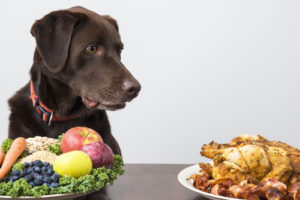
We know it by many names and fear it by them all. Cancer. The word alone has the power to conjure up deep and dark feelings in those of us whose lives have been impacted by it, which is most of us. Statistics show that the majority of American families have relatives who have been diagnosed by cancer.
Unfortunately, our canine family members are at risk in high numbers as well. Stats vary largely depending on breed, but overall between 10-60% of dogs will die because of cancer. In some breeds, like the hugely popular Golden Retriever, the risk factor is at the highest level of 60%.

See what breeds are most prone to cancer.
Although there is no way to completely prevent cancer in any species (YET!) there are some things dog parents can do to give their loved one the best chance at avoiding this terrible disease. Just like with humans, prevention is the best medicine and food plays a vitally important role.
Most Common Types of Canine Cancer
There are a handful of cancers that afflict canines most frequently. Those include:
- Lymphoma: Affects the dog’s immune system, occurring in the lymph nodes and bone marrow. Progresses in five stages, rapidly if untreated.
- Hemangiosarcoma: More common in dogs than any other species, this cancer starts in the blood vessels but spreads without warning to the liver, spleen, heart, or other organs. Remains undetected until it is very advanced.
- Mast Cell Tumors: Very common in older and mixed breed dogs, this form of cancer affects areas of the body with high levels of enzymes and histamines, such as the skin, intestines,and respiratory system.
- Melanoma: This type of skin cancer usually starts in the dog’s mouth and around the lips but is also seen in the eyes, nail beds, and foot pads. It spreads through the deep tissue of the skin to other organs.
- Osteosarcoma: This bone cancer is most common in large breeds, is very aggressive, and spreads rapidly. It can present in any bone, but is most common in the limbs.
Diet Plays an Important Role in Prevention
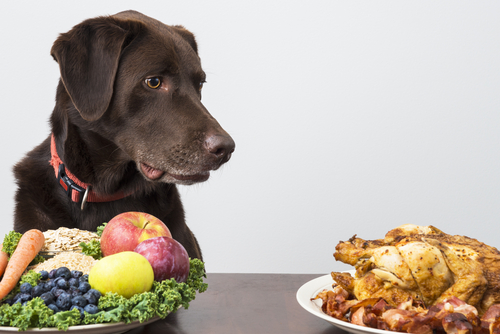
A review published in the National Library of Medicine shows that 30-40% of cancers are preventable through lifestyle and dietary choices alone. Although this research pertained to humans, your dog is no different. What he eats will impact his health, including his ability to stop cancer in its tracks before it has a chance to take hold.
In general, cancer absolutely loves toxins and sugary carbohydrates. The tumors literally feed themselves with those types of compounds. Aside from choosing packaged foods that lack harmful toxins and are full of real, wholesome, low sugar ingredients, dog parents can incorporate “human” foods in their pup’s daily diet that can boost your dog’s cancer prevention powers.
10 Foods that Help Prevent Canine Cancer
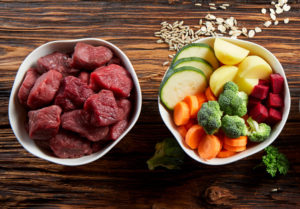
#1 – Broccoli & Other Cruciferous Veggies
These tiny green trees top nearly every list of canine cancer fighting foods. They are chock full of antioxidants, which are the main players in cancer butt kicking.
Think of antioxidants as little crime fighters that circulate through a being’s system eradicating infant cancer cells before they become fully grown and spread their killer seed.
In addition to antioxidants, broccoli has loads of vitamins and minerals that are anti-allergy, anti-inflammatory, and anti-microbial. Talk about an immunity booster!
The greens on top can be irritating to your pup’s system (gas attack!) so it’s best to stick to the stems. Dogs find them tasty and fun to eat, too!
Other crucifers that are safe and well suited to cancer prevention include cabbage, bok choy, turnips, rutabagas, and Brussels sprouts. Try them lightly steamed for easier digestion.
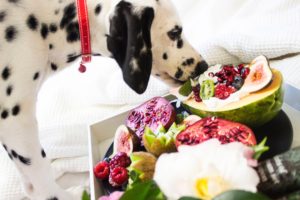
#2 – Berries
Blueberries, raspberries, and cranberries are all super foods to include in your dog’s diet. What makes them good at cancer prevention is the high level of antioxidants contained within. They also have loads of vitamins and fiber and are linked with improved memory and cardiovascular health. If your dog will eat them raw, use them as treats. If she snubs them, which is common for the bitter cranberry and under ripe raspberry, try juices or mixing them in with other tastier ingredients. Cranberry supplements are also a great option.
#3 – Coconut, Flax, or Olive Oil
One of the problems with feeding only commercial dog food to your pup is that it lacks sufficient quantities of good fats. These are the fats that give our bodies essential fatty acids and fuel. Importantly, good fats allow our bodies to absorb and make use of all those good vitamins in our foods without the bad cholesterol that clogs our arteries.
Coconut oil, flax oil, and olive oil are all great choices for dogs due to their tolerance as well their tastiness. They are super simple to administer, as well. Simply add some to anything your dog is eating. Mixing an appropriate amount over kibble is an excellent way to boost the nutritional value of your dog’s meal as well as its yumminess.
- Flax oil: 1 teaspoon per 20 pounds daily
- Olive oil: 1 teaspoon per 20 pounds daily
- Coconut oil: 1 teaspoon per 10 pounds daily
#4 – Parsnips
Parsnips are a root veggie that look like a white carrot but taste less sweet. Many dogs love carrots and will eat them raw as treats. Parsnips can be fed raw in cut up chunks or cooked if your dog tends to swallow things without chewing.
They prevent cancer via the all powerful antioxidant and vitamin K for bone health. They also help keep your dog’s nervous system healthy, boost her immune system with vitamins and minerals, deliver loads of fiber for healthy digestion, and contain ingredients that increase her metabolism. Who knew that parsnips were so powerfully healthful?!
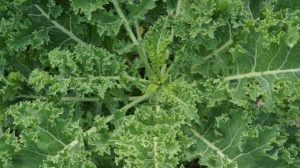
#5 – Kale and Other Dark Leafy Greens
Kale rules supreme when it comes to dark, leafy veggies we should allbe consuming on the regular. However, greens should be used sparingly with dogs mainly because they can easily cause gastric upset.
Kale, Swiss chard, spinach, beet greens, collard greens and more are all considered “dark leafy greens” and they are widely used in smoothies, eaten raw, or cooked with a bit of fat for flavor and vitamin absorption. They contain isothiocyanate, which lower the risk of cancer.
As with all green plants, dark leafy greens also contain chlorophyll, which has a special cancer preventing benefit for dogs. Chlorophyll blocks the absorption of intensely carcinogenic aflatoxins, which are present in many commercial dog foods, especially those containing corn.
If antioxidants are cancer crime fighters, chlorophyll is the bouncer at the door to your dog’s bloodstream. With chlorophyll at the door, carcinogens don’t stand a chance of getting in.
NOTE: If your dog is prone to kidney or bladder stones, kale and all dark greens that are high in calcium oxalate should be avoided all together. Talk to your vet for guidance.
#6 – Peaches and Plums
Bring on the pitted fruits! Juicy, sweet, and delicious these fruits will be a healthy snack that will leave your pup begging for more. Little does she know, these sweet treats are powerhouses when it comes to cancer prevention.
Peaches are not only rich in antioxidants, they are also highly effective at removing toxins from the body. The more toxins we get rid of, the better chance we have at avoiding cancer. As a bonus, they help keep skin healthy by fighting skin infections. You must remove the pit first because they are toxic to dogs and your pup could choke on it.
Plums are a healthy antioxidant food that also have vitamin C and iron. Just as with peaches, the pit can be toxic or a choking hazard so remove it before delivering this burst of flavor to your best friend.

#7 – Eggs
Oh, the incredible edible egg. It really is the perfect food. A source of complete protein, low in calories, and high in vitamin D3, a known contributor to cancer prevention. Dogs will relish the chance to eat an egg every morning any way you want to fix it. Raw, boiled, fried, or scrambled your dog will be down with the egg. Cook it up in a bit of that oil with good fat and get a double dose of cancer blocking.
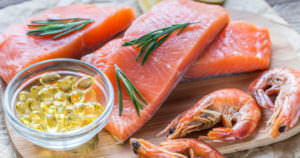
#8 – Fish Oil or Actual Fish
Here’s that good fat again! Fish (or fish oil if supplementing) has wonderfully healthy levels of good fat for you or your pup. It also contains vitamin D3 making it even stronger force against would-be cancer lurking around your dog’s system. Salmon, sardines, cod, and shrimp are great options for dogs. Choose wild over farmed for their higher levels of nutrients.
#9 – Turmeric
Turmeric contains curcumin, which is a super duper cancer fighter. Curcumin stops the growth and spread of cancer cells, making it an excellent addition to everyone’s diet. It is perfectly safe for you or your dog to eat but it’s a bit tricky to ensure your body absorbs it. If you just dump some loose spice in your dog’s food, it will likely go right through his system without being used. Choose a supplement to make sure you get the right mix of ingredients for proper absorption.
#10- Palm Fruit Oil
Palm fruit oil contains tocotrienols, or a form of biologically active vitamin E. Multiple studies have been done that show that tocotrienols trigger the death of cancer cellsand block the spread of cancer cells. Palm fruit oil also boosts immunity, improves eye health, helps control blood sugar, and improves absorption of vitamins and minerals. Mix in with other foods and enjoy the cancer fighting benefits of this oil.
We are learning more and more about the link between nutrition and disease. Cancer poses a huge threat to our health and to that of our beloved pets. An ounce of prevention is worth a pound of cure. Incorporate these cancer preventing foods into your dog’s diet and help stop cancer before it even starts.
Sources:
The American Animal Hospital Association: http://bit.ly/2PYeC2H
Dogs Naturally Magazine: http://bit.ly/2vU06iU
National Canine Cancer Foundation: http://bit.ly/2PWITyJ; http://bit.ly/2vU06zq
The post 10 Best Cancer Preventing Foods For Your Dog appeared first on iHeartDogs.com.
via Whisker Therapy